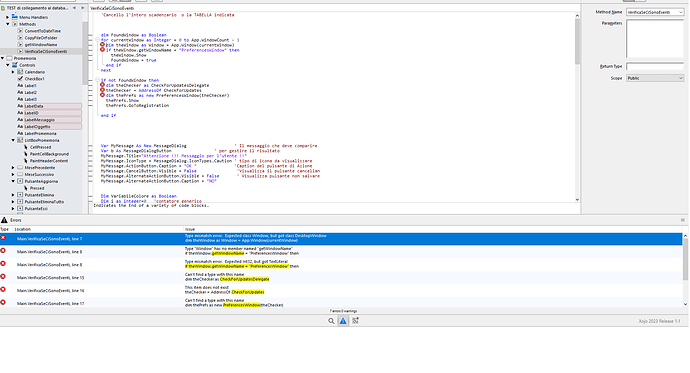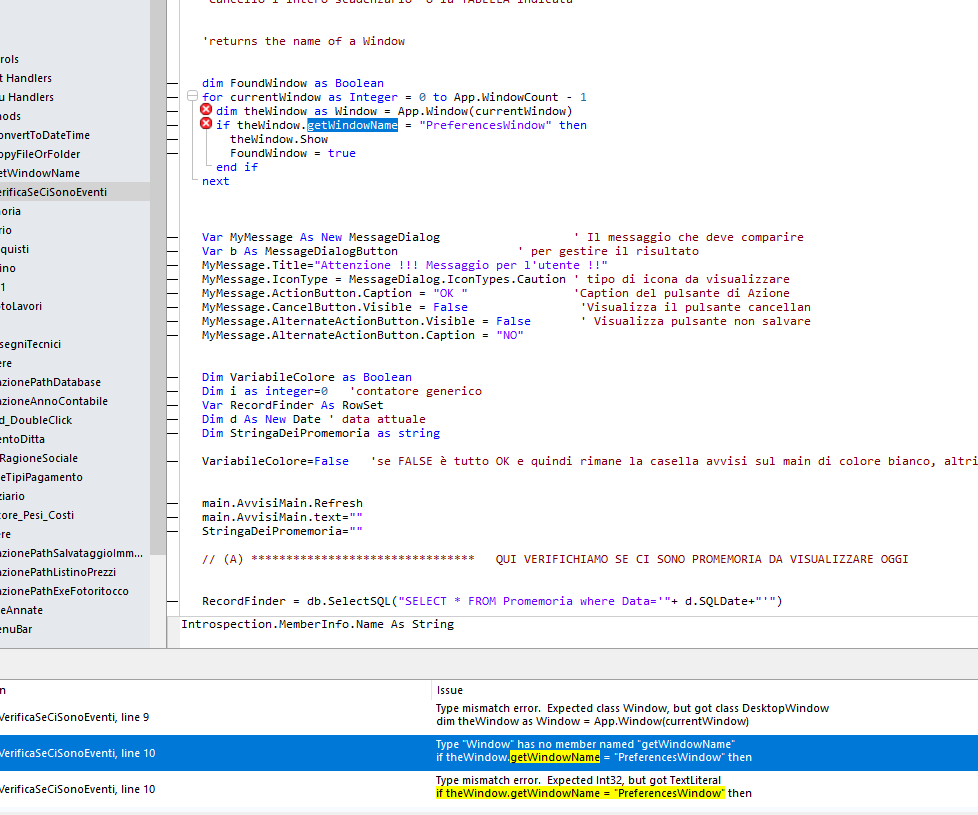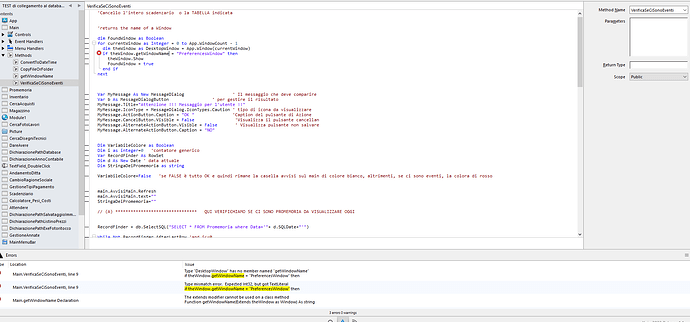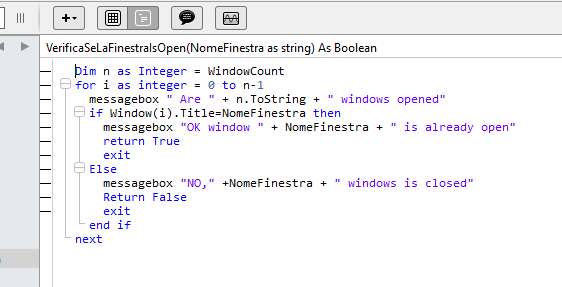Hi group, I need to display messages only if a certain window is open. How can I check if it is open or closed … I wrote if reminder.visible then … but it doesn’t work.
Thanks.
It is possible to test the window.title
In that window, add a shared property IsOpen As Boolean. In the Opening event, set that to True, and in the Closing event, False.
Elsewhere in code, you can check reminder.IsOpen.
With some introspection you can get the name:
Public Function getWindowName(Extends theWindow as Window) As String
'returns the name of a Window
Dim theTypeInfo as Introspection.TypeInfo = Introspection.GetType(theWindow)
Return theTypeInfo.Name
End Function
And then:
dim FoundWindow as Boolean
for currentWindow as Integer = 0 to App.WindowCount - 1
dim theWindow as Window = App.Window(currentWindow)
if theWindow.getWindowName = "PreferencesWindow" then
theWindow.Show
FoundWindow = true
end if
next
if not FoundWindow then
dim theChecker as CheckForUpdatesDelegate
theChecker = AddressOf CheckForUpdates
dim thePrefs as new PreferencesWindow(theChecker)
thePrefs.Show
thePrefs.GoToRegistration
end if
You can iterate through windows to see if that specific window is open:
If WindowCount > 0 Then
Var foundWindow As Boolean = False
Var n As Integer = WindowCount - 1
For i As Integer = 0 To n
If Window(i) IsA FileSetting Then//FileSetting is a window
foundWindow = True
Exit//no point in searching anymore, we found it
End If
Next i
FileSettings.Enabled = If(foundWindow, False, True)//enable this thing if it found a FileSetting window
End If
Hi Beatrix, I’m trying your solution, but I get several errors, I’m probably doing something wrong or I’m missing something.
I quickly grabbed some code. The second part with the update check is not needed.
getWindowName comes from some introspection:
Public Function getWindowName(Extends theWindow as Window) As String
'returns the name of a Window
Dim theTypeInfo as Introspection.TypeInfo = Introspection.GetType(theWindow)
Return theTypeInfo.Name
End Function
dim theWindow as DesktopWindow
Did you add the function “getWindowName” I posted above?
Yes but it doesn’t work. It gives me errors like it does in photos…
I wrote an alternative code.
Is it ok?
Can you tell me if it is ok or can be improved?
(I need to find the name of a window in the open windows, and then I can check if this window is open or closed)
Look carefully at your code. It will examine window number zero and no others.
Sorry for the delay in responding TIM, but my code tells me that there are X windows open, and one of these has the title as “WindowName”". I did some tests and it seems to work.
If I open 6 windows, it reads all 6 and identifies if there is one with the indicated title.
In both branches of the if-statement, you Return. Therefore it can only examine one window. The exit statements are never reached.
Sorry, I can’t understand the problem, maybe I don’t translate English well. Maybe I understood what you mean, basically, the window you are looking for is there or it isn’t, it comes out of the if statement. You’re right, I have to remove the return from the if that tells me if it isn’t there. In practice, if it isn’t there, you have to keep looking until you find it or until the windows run out. Right ?
Rewrite it thus:
Var n as Integer = WindowCount - 1
for i as Integer = 0 to n
if (Window(i).Title=NomeFinestra) then Return True
next
Return False
Correct. Tim’s code is clean and short but I wanted to comment on your original code to try to make sense to you:
Dim myReturn as Boolean // this will be False by default, will change to True if we find the Window
Dim n as Integer = WindowCount
for i as integer = 0 to n-1
messagebox " Are " + n.ToString + " windows opened"
if Window(i).Title=NomeFinestra then
messagebox "OK window " + NomeFinestra + " is already open"
//return True
myReturn = True //only change to True if we find the Title
exit //exit the for/next because we found the Window
//or we can just Return True and don't use the above 2 lines
Else
messagebox "NO," + NomeFinestra + " windows is closed"
//Return False //we should not return False on the first 'No' window found
//exit // we should not exit either
end if
next
Return myReturn //either True if we found the window or False if not
I guess you are using MessageBox to help you debug your code.
Someone recommended me to look at DebugLog instead (when I started using Xojo and learn about debug), so now is my turn to recommend you use System.DebugLog instead of MessageBox.
I strongly agree with @AlbertoD here.
Using MessageBox (or MsgBox in older versions) changes the execution of the program. It may pause code, cause additional events to be fired, etc…
In other words, you may be causing additional issues of getting false positives in the code you’re debugging when you try to “Message Box Debug”.
It’s very easy to log errors, just change any MessageBox call like this:
Before:
MessageBox("My Error.")
After:
System.Log(System.LogLevelDebug, "My Error.")
The first parameter is the “Log Level”. It’s easiest to just use “System.LogLevelDebug” unless you have a reason to use a different option.
The errors show up in the messages pain in the IDE:
Simple example app attached.
myLoggingApp.xojo_binary_project.zip (5.2 KB)
And to see the logs, just click in the right icon (@ window IDE bottom)

the one with a star.
The area is updated in real time during the application excution.
Try it and love it.




